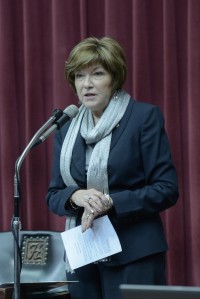This week marks the halfway point of the Missouri General Assembly’s very productive 2015 legislative session. Already the House has passed legislation to protect Missouri students, help low-income individuals find employment, spur job creation, and reform our state’s healthcare system.
The anti-bullying legislation I sponsored, House Bill 458, passed the House of Representatives by a bipartisan vote of 121 to 33. Too many young people in our state are victims of bullying at school or online. Such harassment can lead to poor grades, depression, and even suicide. We can and must do more to protect our children. HB 458 would define cyberbullying in law; prohibit bullying on school property, at school functions, or on school buses; and require school districts to implement more comprehensive anti-bullying policies. Schools’ policies would require staff to report bullying, define a range of responses to bullying, and outline a process for training employees and volunteers.
I have filed similar legislation for the past three years, but these bills were stopped by a small group of legislators who wanted the bill to define select groups of students who would be protected from bullying. HB 458 requires every student to be treated equally because any child can be bullied and all of them are equally precious.
I also worked closely with several other Representatives on two welfare reform bills, House Bill 985 and Senate Bill 24, that will reduce wasteful spending and help low-income individuals find employment.
Too much of the money meant to help families get back on their feet goes instead to individuals who are not eligible for assistance. From 2010 to 2015, the federal government questioned millions of the Temporary Assistance for Needy Families (TANF) dollars spent by Missouri’s Department of Social Services (DSS), and our state faced a penalty after our food stamp error rate was more than double the national average in 2012. HB 985 would require DSS to contract with a third party to verify the eligibility of applicants and recipients based on their income and assets. The data verification service would also check for participants who have died, moved out of state, or are incarcerated.
The only real solution to poverty is to help individuals find gainful work and become self-sufficient. Senate Bill 24 would restructure Missouri’s welfare system by prioritizing permanent employment and personal responsibility rather than perpetual dependence on government assistance. Any ongoing savings from these reforms would be reinvested in child care, education, job training, and transportation assistance for low-income families. Rather than cutting welfare, SB 24 refocuses spending on the services that will help Missouri families permanently move out of poverty.
TANF recipients are currently supposed to complete work activities, but in 2009 Missouri’s TANF work participation rate was only 13.2%. Under SB 24, most able-bodied adults would have to complete work activities before becoming eligible for TANF. These activities could include unsubsidized employment, job search and readiness training, or community service, which will help individuals develop skills to find permanent jobs. If they fail to complete the necessary work activities, they would meet face-to-face with a DSS caseworker and have six weeks to comply. If not, their benefits would be reduced by 50% for up to 10 weeks. Further refusal to work, volunteer, or participate in job training would result in their case being closed. SB 24 would also restore work requirements for individuals receiving food stamps. Missouri currently has a waiver exempting individuals from the work requirements found in federal law.
SB 24 sets aside TANF funding for healthy marriage promotion, activities encouraging responsible fatherhood, and alternatives to abortion services. To further support families, income from a recipient’s new spouse would not be counted toward their eligibility limit for the first six months of their marriage.
The bill as passed by the House would also cap TANF eligibility at 30 months instead of five years. TANF is supposed to be temporary help for families going through a rough patch, not a long-term welfare trap. A lower eligibility cap will encourage individuals to find employment and free up state resources for those who are truly in need. The version passed by the Senate capped eligibility at 48 months, so the final number will be hammered out in conference committee.
Other bills passed by the House of Representatives include:
Pay Increase Rejection (HCR 4 – Rep. Jay Barnes) – One of the House’s first actions this session was to reject a proposed pay increase for elected officials.
Voter ID Legislation (HJR 1 and HB 30 – Rep. Tony Dugger) – Upon voter approval, these bills would require voters to show photo identification at the polls to preserve the integrity of our elections.
Big Government Get off My Back Act (HB 32 – Rep. Denny Hoskins) – Extends a tax relief program that has helped nearly 200 small businesses. It has a proven record of success and is responsible for hundreds of good-paying jobs.
Education Reform (HB 42 – Rep. David Wood) – Addresses the school transfer issue to give the 62,000 children in failing schools an opportunity to receive a world-class education. This bill would allow students in failing schools to move to better-performing schools in their district, attend a charter school, or take advantage of a virtual school option.
Worker Freedom Legislation (HB 116 – Rep. Eric Burlison) – Gives workers the freedom to choose whether or not to join a union. This is the first time a Chamber of the General Assembly has passed a Right-to-Work bill and sent it to the other side of the building.
Medical Malpractice Reform (HB 118 – Rep. Burlison) – Would tame skyrocketing healthcare costs and keep doctors in our state by restoring reasonable limits ($350,000) on medical malpractice non-economic damages.
Unemployment Reform (HB 150 – Rep. Scott Fitzpatrick) – Ties unemployment benefits to the unemployment rate and requires the unemployment fund to have more cash on hand. This will ensure that Missourians have access to unemployment benefits while protecting Missouri’s job creators from excessive taxes and fees.
Prosecuting Sex Trafficking Advertisers (HB 152 – Rep. Elijah Haahr) – Strengthens Missouri’s child sex trafficking laws by making it a crime to knowingly advertise a trafficking victim. Under this legislation, someone advertising a young child for commercial sex could face life in prison.
Safety Standards for Clinics (HB 190 – Rep. Kathy Swan) – Protects women from subpar medical care by requiring ambulatory surgical centers that perform abortions to be inspected annually.
Dairy Revitalization Act (HB 259 – Rep. Bill Reiboldt) – In the past decade 2,500 dairy farms in our state have closed their doors. This bill seeks to revitalize Missouri’s struggling dairy industry. It includes a premium assistance program to provide financial protection to dairy farmers when times get tough and a scholarship program to encourage young people to pursue agricultural careers.
In an effort to minimize office expenses, I use the free version of WordPress.com to blog. Unfortunately, this means my office has no control over the content or placement of ads on this site. Thank you for understanding.

